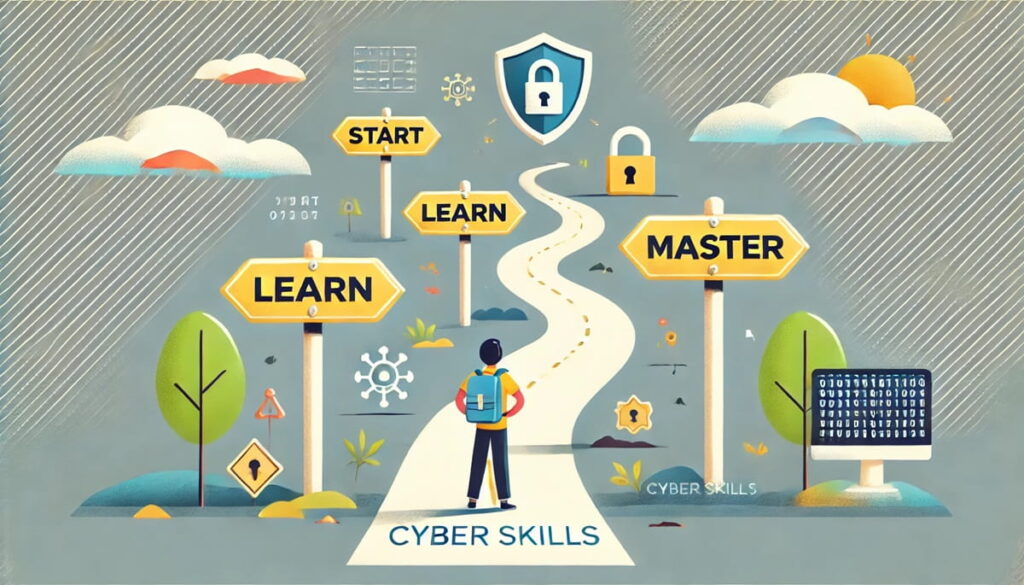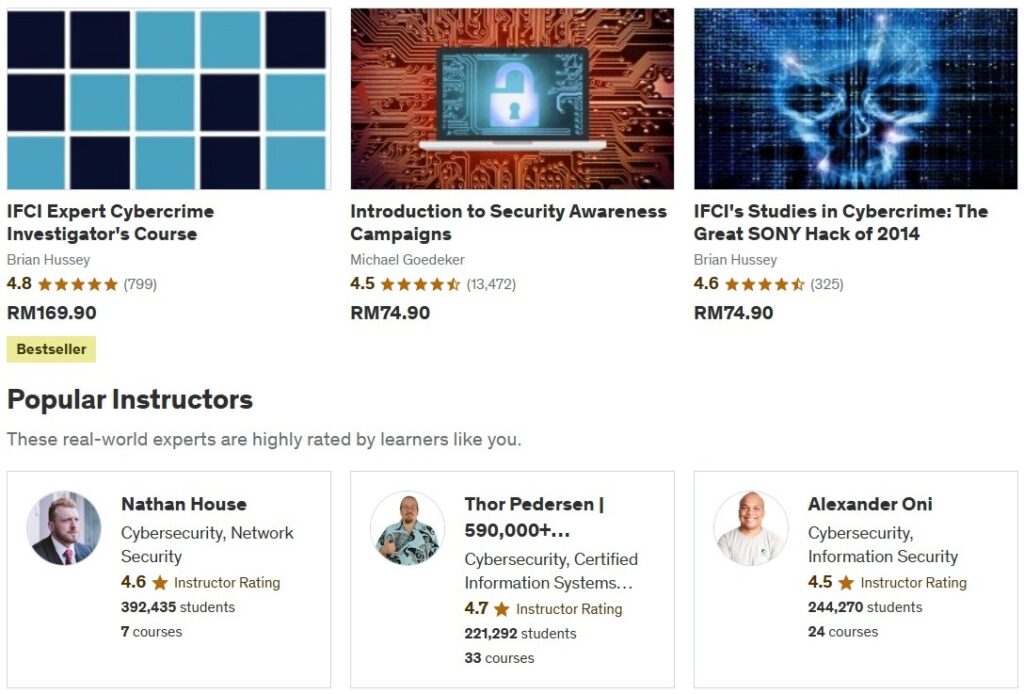Many people have asked, “Is cybersecurity hard to learn?” It’s a fair question, especially since the technical details of computers and networking seem incompatible with the real world. Yet, with the growing demand for cybersecurity professionals, breaking into this field can be lucrative.
While technical skills are often involved, learning cybersecurity doesn’t have to be overwhelming. With the right mindset and resources, anyone can build the skills needed for a successful career. In this article, we’ll examine what makes cybersecurity seem challenging and why it’s more accessible than you might think.
In this article, we’ll explain cybersecurity, why some people find it challenging, and why it may be more accessible than you think.
1. What is Cybersecurity?

Cybersecurity refers to the protection of computers, networks, and data from unauthorized access, attacks, or damage. It involves various methods and technologies to keep information safe and ensure systems function correctly.
However, this is also a broad definition since cybersecurity can be divided into multiple specializations.
Some critical areas within cybersecurity include:
- Network Security: Protecting a computer network from hackers, malware, and data breaches.
- Information Security: Safeguarding sensitive data from unauthorized access or corruption.
- Ethical Hacking: Also known as Penetration Testing, ethical hacking tests systems to find weaknesses attackers could exploit.
- Incident Response: Handling and responding to security breaches to minimize damage.
- Security Compliance: Ensuring that organizations follow rules and regulations regarding data protection.
As you can see, this diversity in specialization can require different skills. While some roles may need advanced technical knowledge, others focus on policies, management, or monitoring security systems. This complexity often brings the question, “Is cybersecurity hard?” to the fore.
There are paths for people with both technical and non-technical backgrounds, making the field accessible at different levels.
2. Why Cybersecurity Can Seem Difficult
For some people, cybersecurity is hard to learn for several reasons. Here are some of the main challenges that beginners often face:
Technical Jargon and Concepts
Cybersecurity involves a lot of specialized terminology and complex ideas that can be confusing at first. Words like encryption, firewall, zero-day vulnerability, and multi-factor authentication may seem overwhelming if you’re unfamiliar with them.
The technical aspects of the field, such as understanding how computer networks function, how different types of malware operate, or how encryption algorithms work, can feel intimidating.
Rapid Changes
The cybersecurity landscape is constantly evolving. New threats always emerge, and the tools and techniques used to defend against them continually change. This means that professionals in the field need to learn and adapt continuously.
For someone just starting, the fast pace can make it seem like there is always more to learn, which can be discouraging.
Wide Range of Skills Needed
Cybersecurity isn’t just about one skill or area of expertise. It can also involve knowledge of networking, software development, risk management, and even law or compliance.
Depending on the role you’re aiming for, you may need to learn everything from coding and scripting to understanding industry regulations. This can make the field feel broad and challenging to grasp.
High Standards for Certifications
Many cybersecurity roles require certifications such as Certified Information Systems Security Professional (CISSP) or Certified Ethical Hacker (CEH).
These certifications often have strict requirements and challenging exams, which can create a steep learning curve for newcomers. The effort and time needed to prepare for these certifications might make the field seem out of reach for some people.
3. How to Get Started in Cybersecurity

Despite the challenges, there are plenty of reasons why learning cybersecurity is more accessible than it may seem. Here are some factors that can make it easier to get started:
Use The Many Learning Options
Many resources are available for learning cybersecurity, ranging from free online courses and YouTube videos to paid certification programs and university degrees.
Websites like Cybrary, Udemy, and TryHackMe offer beginner-friendly courses that break down complex topics into simple, easy-to-understand lessons. With so many options, you can choose a learning method that fits your schedule, budget, and learning style.
Start With Beginner-Friendly Roles
If the phrase “Is cybersecurity hard?” is stuck in your mind, remember that not all cybersecurity jobs require you to be an expert immediately. Some entry-level positions, such as security analyst or security operations center (SOC) analyst, allow you to start with basic tasks and gradually build your skills.
These roles often focus on monitoring and responding to security alerts, which initially don’t require deep technical expertise.
Join Communities and Forums for Support
The cybersecurity community is large and welcoming, with many groups dedicated to helping newcomers.
Online forums like Reddit’s r/cybersecurity or Discord communities provide spaces where learners can ask questions, share resources, and get advice from experienced professionals. These communities can be a great source of support, encouragement, and practical tips.
User-Friendly Tools
While some cybersecurity tasks do involve coding, there are tools available that don’t require you to be a programmer to use them effectively. For instance, security information and event management (SIEM) tools or vulnerability scanners come with user-friendly interfaces that simplify tasks like monitoring logs or detecting threats.
4. Comparing Cybersecurity to Other Fields
To better understand whether is cybersecurity hard, it helps to compare it to other fields. Here’s how it stacks up against a few popular career paths:
Cybersecurity vs. Coding
Learning to code can also be challenging, especially when mastering programming languages like Python, Java, or C++. However, cybersecurity only sometimes requires deep programming skills.
While coding knowledge can be helpful, especially in roles like penetration testing, many entry-level cybersecurity positions focus more on using tools and understanding security concepts.
Cybersecurity vs. Data Analysis
Data analysis often involves understanding complex statistics and working with data visualization tools. Both fields require problem-solving skills, but in cybersecurity, you’ll be focused more on detecting and responding to threats.
Cybersecurity also involves more hands-on tasks, like setting up firewalls or performing security tests, while data analysis can be more about sitting behind a desk and crunching numbers.
Cybersecurity vs. General IT
If you already have experience in IT, learning cybersecurity can be a smoother transition. Many skills overlap, such as understanding networks, troubleshooting, and managing systems.
However, cybersecurity might seem more difficult for people from non-IT backgrounds due to the need to understand technical concepts. But overall, the wide range of roles available in cybersecurity means there’s likely a starting point that fits your background.
5. Formal Cybersecurity Education and Certification
If you’re serious about entering cybersecurity, your resume will need to be officially approved. That means specialized higher education, professional certification, and possibly sandboxed experience.
Here are some popular options to consider:
Degrees and College Programs
Formal education can be a good choice if you prefer structured learning. Many universities offer degree programs in cybersecurity, computer science, or information technology with a cybersecurity focus.
These programs provide a broad foundation and are valuable for networking with peers and professors. However, they can be time-consuming and expensive compared to other options. Some programs to consider include:
- Carnegie Mellon University: Bachelor of Science in Information Security and Cyber Defense.
- University of Southern California: Bachelor of Science in Cyber Operations.
- Stanford University: Master of Science in Computer Science with a concentration in Cybersecurity.
Certifications
Certification is another popular way to validate your skills in specific cybersecurity areas. Some standard entry-level certifications include:
- CompTIA Security+: A great starting point for beginners, covering basic security concepts and practices.
- Certified Ethical Hacker (CEH): Focuses on ethical hacking techniques used to identify vulnerabilities.
- Certified Information Systems Security Professional (CISSP): More advanced, often aimed at experienced professionals.
Earning certifications can help you get a job without a degree, as they show employers you have practical skills in critical areas. Certifications also serve as a structured learning path, guiding you through essential topics step by step.
Self-Study and Online Courses
Many self-study resources are available if you prefer learning at your own pace. Websites like Udemy, Coursera, and Cybrary offer everything from basic security principles to advanced penetration testing courses. Some resources are even free.
Platforms like TryHackMe and Hack The Box provide hands-on labs to practice cybersecurity skills in simulated environments, a great way to apply your knowledge. Others include:
Capture The Flag Competitions
CTF competitions are interactive events where participants solve security-related challenges. These events can help you develop hands-on skills and are often geared towards different skill levels, from beginner to expert.
They provide a fun way to practice problem-solving and learn from others. Here are some ideas to get you started:
- Carnegie Mellon University hosts one of the world’s most prestigious CTF competitions, PlaidCTF, which is ideal for testing one’s skills.
- The University of Cambridge participates in and recommends CTF competitions such as the “Cambridge2Cambridge Cyber Challenge.”
- Stanford University encourages students to participate in the “Collegiate Penetration Testing Competition (CPTC)” for practical experience.
- University College London (UCL) hosts workshops and challenges for beginners, such as the UCL Cybersecurity CTF.
6. Final Thoughts
So, is cybersecurity hard to learn? The answer depends on various factors, but overall, while the field presents challenges, it is certainly achievable with the right approach.
The perception that cybersecurity is challenging often comes from its technical nature, the fast-changing landscape, and the broad range of skills required. However, many pathways and resources can make learning easier.
Ultimately, cybersecurity is not beyond reach. If you’re curious about cybersecurity, don’t let the perceived difficulty discourage you—take the first step and start exploring the possibilities.
The post Is Cybersecurity Hard to Learn? (4 Strong Entry Paths) appeared first on HideMyTraffic.






